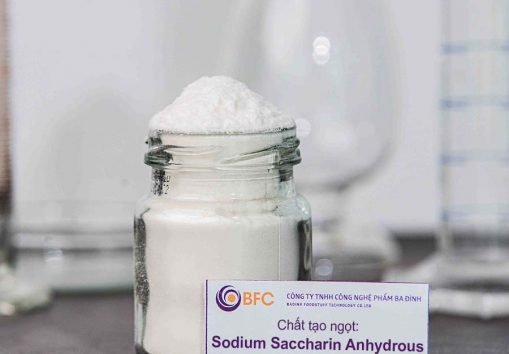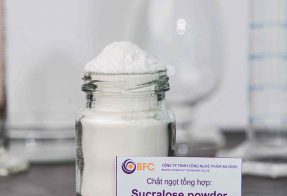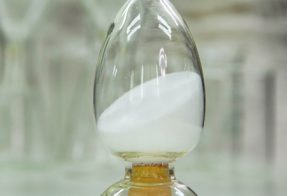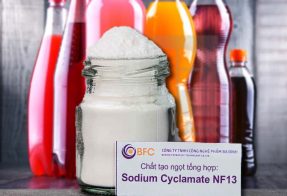Synthetic sweetener – Sodium Saccharin Anhydroous
04.11.2021
Manufactured sweeteners
E954 (iv)
Today, many people use artificial sweeteners to reduce the amount of calories in their diets. Sweetener Saccharin with the symbol E954 no calories, can be used in a variety of foods and beverages.
E954 (iv)
Today, many people use artificial sweeteners to reduce the amount of calories in their diets. Sweetener Saccharin with the symbol E954 no calories, can be used in a variety of foods and beverages.
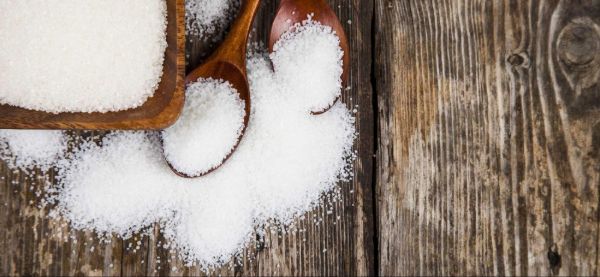
1. Product information
- Chemical name: Saccharin; 1 – dioxo-1,2-benzothiazol-3-1
- Trade name: Sweet and Low, Sugar Twin, Sweet Magic
- Description: white crystallization
- International Index: E954 (INS 954)
- Chemical formula: C7H5NO3S
- Molecular Structure (1):
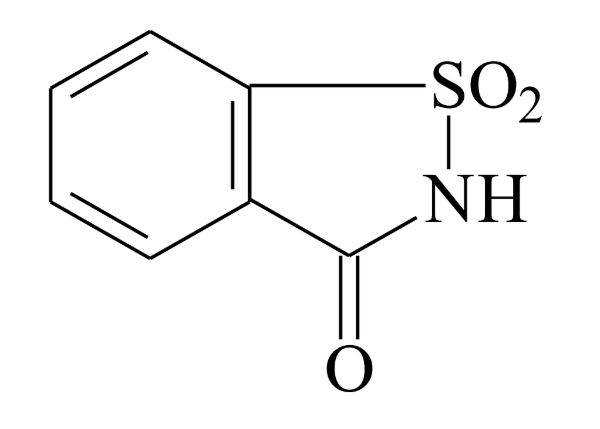
- Molecular Weight: 0.828g/cm3
- Field: Food additives: Sweeteners
- Melting Point: 228.8 – 229.7℃
- Solubility: Slightly soluble in water (0.45g/100ml) but easily soluble in sodium and calcium salts
2. Application
2.1. In reality:
- Saccharin is one of the most common and well-known synthetic sweeteners besides Sucralose and Acesulfame K. Synthetic sweeteners are widely used in the food industry, and can appear on virtually any food. which product. In addition to the main effect of creating sweetness, Saccharin also acts as a sweetener for products and does not contain calories. By using a small amount of Saccharin, the diet foods completely get the sweetness of the product without producing calories, energy.
- Saccharin stable in acidic medium. Hence it can be used in sour drinks such as orange juice, lemonade, mixed juice
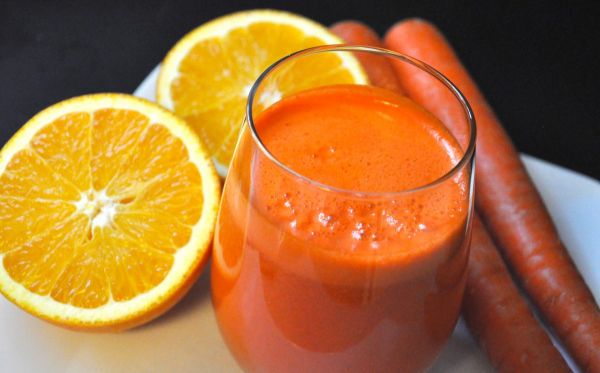
Sweetener Saccharin used in yellow orange carrot juice
- Saccharin is a thermostable substance, i.e. it is not easily changed or destroyed by heat. At high temperatures, the sweetener Saccharin retains its inherent sweetness. This is the reason why Saccharin is abundant in baked goods such as bread, cookies.
- One note when using sweetener E954 is that it has a slightly bitter aftertaste along with a metallic smell when used in high concentrations. Therefore, Saccharin is often used in combination with other sweeteners such as aspartame in low concentrations to help overcome this drawback.
2.2. Usage rate:
- Subjects of use and content as prescribed in Circular 24/2019/TT-BYT regulating the management and use of food additives.
- Saccharin sweeteners are classified as Saccharins, including Saccharin INS 954(i); Calcium Saccharin INS 954(ii); Potassium Saccharin INS 954(iii); Sodium Saccharin INS 954(iv).
- To help you understand better, BFC would like to quote part of the dosage table for Sweetener E954, specified in the above Circular (2):
| Mã nhóm thực phẩm | Nhóm thực phẩm | ML (mg/kg) |
| 01.1.4 | Đồ uống từ sữa dạng lỏng có hương vị | 80 |
| 01.6.5 | Sản phẩm tương tự phomat | 100 |
| 01.7 | Đồ tráng miệng từ sữa (Ví dụ: bánh pudding, sữa chua trái cây hoặc sữa chua có hương vị,..) | 100 |
| 02.4 | Đồ tráng miệng từ chất béo, không bao gồm đồ tráng miệng từ sữa thuộc mã nhóm 01.7 | 100 |
| 03.0 | Đá thực phẩm, bao gồm nước quả ép lạnh và kem trái cây | 100 |
| 04.1.2.3 | Quả ngâm dấm, dầu hoặc nước muối | 160 |
| 04.1.2.10 | Sản phẩm quả lên men | 160 |
| 12.6 | Nước chấm và các sản phẩm tương tự | 160 |
| 13.4 | Thực phẩm ăn kiêng để giảm cân | 300 |
| 14.1.3.1 | Necta quả | 80 |
| 14.1.3.2 | Necta rau củ | 80 |
| 14.1.3.3 | Đồ uống cô đặc từ nước có hương vị (dạng rắn hoặc lỏng) | 300 |
3. Packing
- Weight: 25kg/carton
4. Shelf life and storage
- Shelf life: 24 months from date of manufacture
- Storage: in a dry place, away from moisture. Avoid storing, storing with hazardous materials and chemical products.
BFC specializes in providing quality food additives, immediately call hotline 0243. 715. 3333 (HN) – 0283.849.3321 (HCM) for support.
Reference source:
(1)Appendix 4, QCVN 4-8:2010/BYT National Technical Regulation on Food Additives – Synthetic Sweetener, Ministry of Health, May 20, 2010, link http://www. fsi.org.vn/van-ban-phap-ly/1026_3042/qcvn-4-82010byt-quy-chuan-ky-thuat-quoc-gia-ve-phu-gia-thuc-pham-chat-ngot-tong- hop.html
(2)Page 274-278, Circular 24/2019/TT-BYT regulating the management and use of food additives, Ministry of Health, dated August 30, 2019, link http://www.fsi. org.vn/van-ban-phap-ly/1003_6079/thong-tu-242019tt-byt-quy-dinh-ve-quan-ly-va-su-dung-phu-gia-thuc-pham.html
Reference source:
(1)Appendix 4, QCVN 4-8:2010/BYT National Technical Regulation on Food Additives – Synthetic Sweetener, Ministry of Health, May 20, 2010, link http://www. fsi.org.vn/van-ban-phap-ly/1026_3042/qcvn-4-82010byt-quy-chuan-ky-thuat-quoc-gia-ve-phu-gia-thuc-pham-chat-ngot-tong- hop.html
(2)Page 274-278, Circular 24/2019/TT-BYT regulating the management and use of food additives, Ministry of Health, dated August 30, 2019, link http://www.fsi. org.vn/van-ban-phap-ly/1003_6079/thong-tu-242019tt-byt-quy-dinh-ve-quan-ly-va-su-dung-phu-gia-thuc-pham.html


